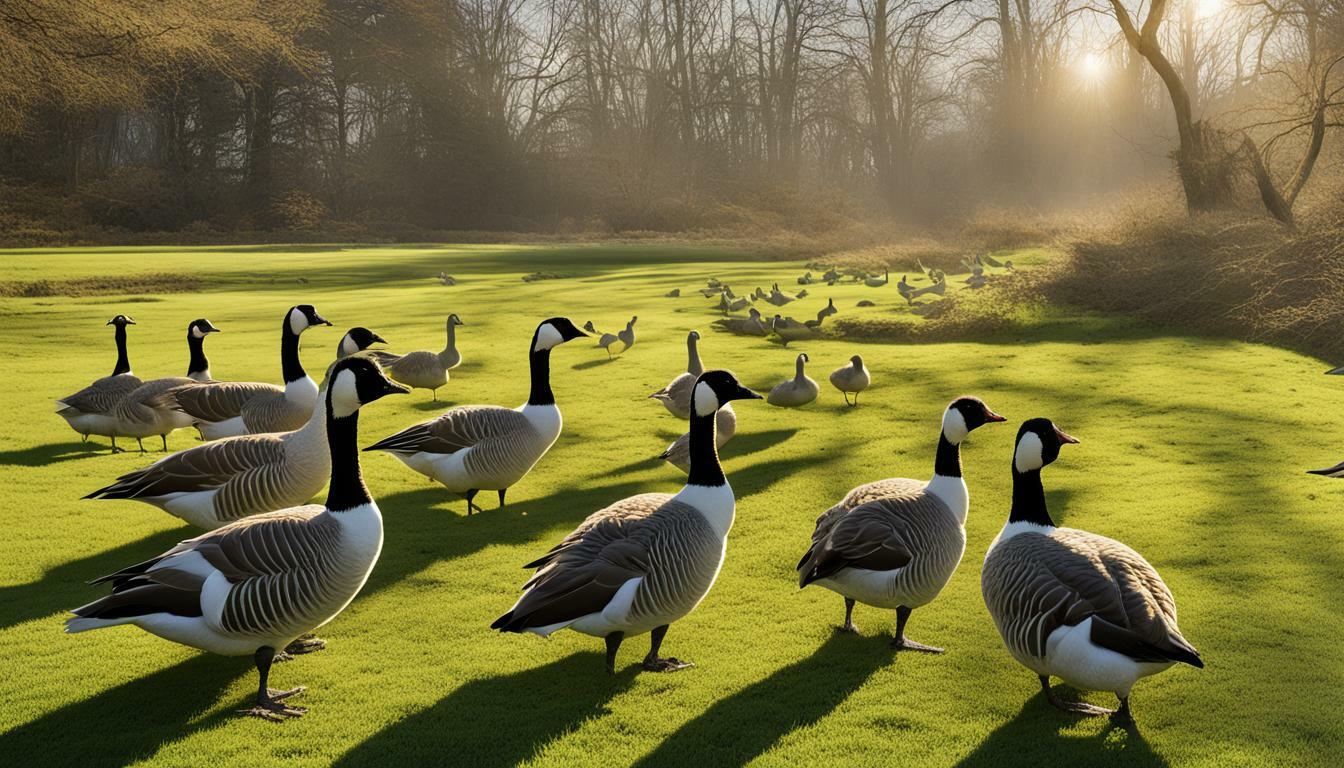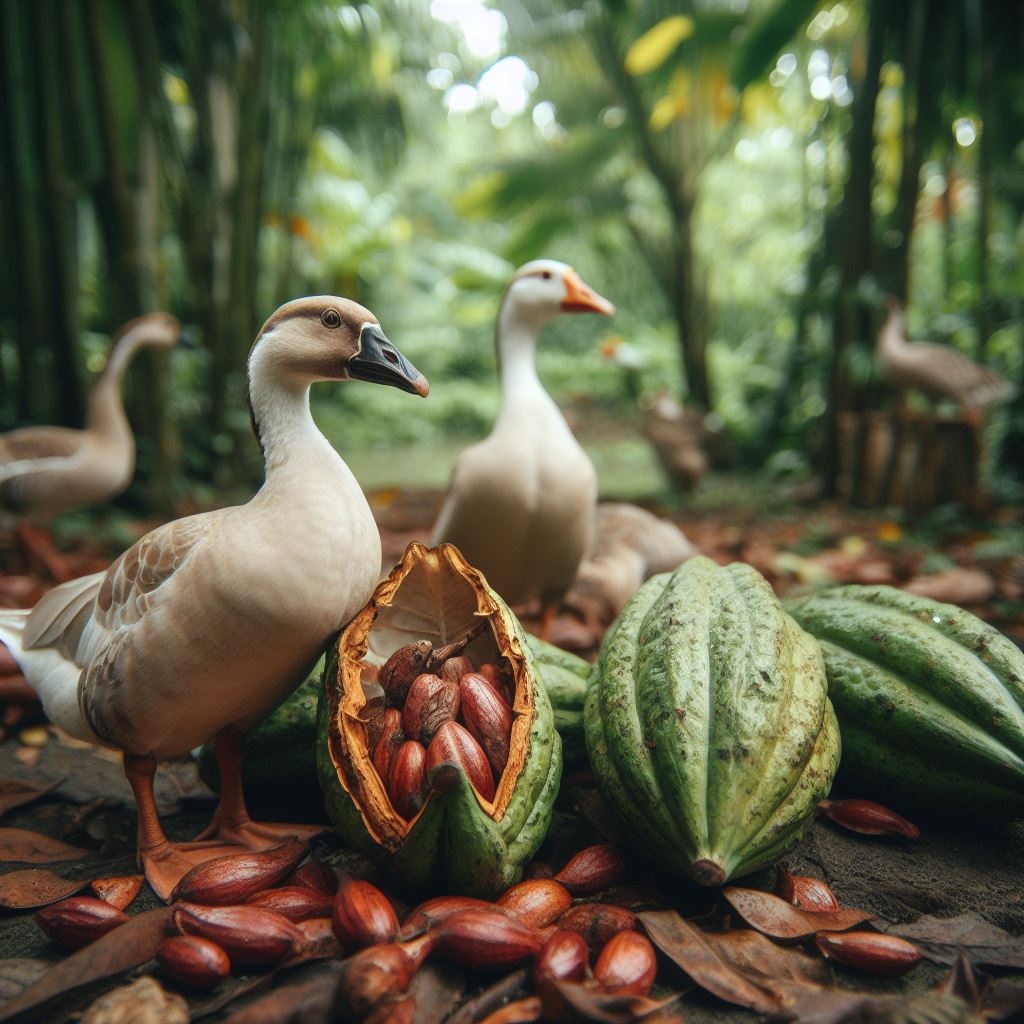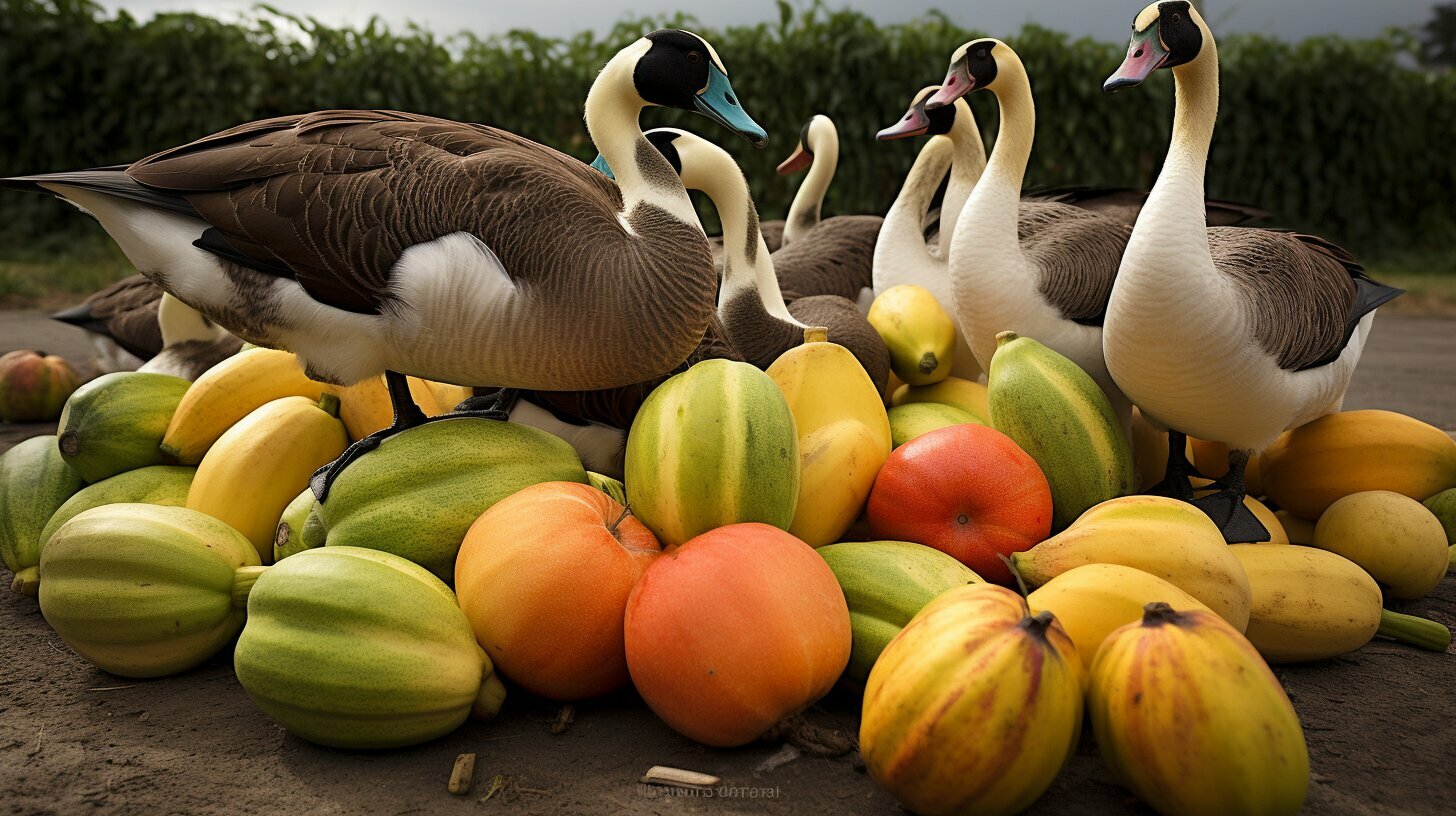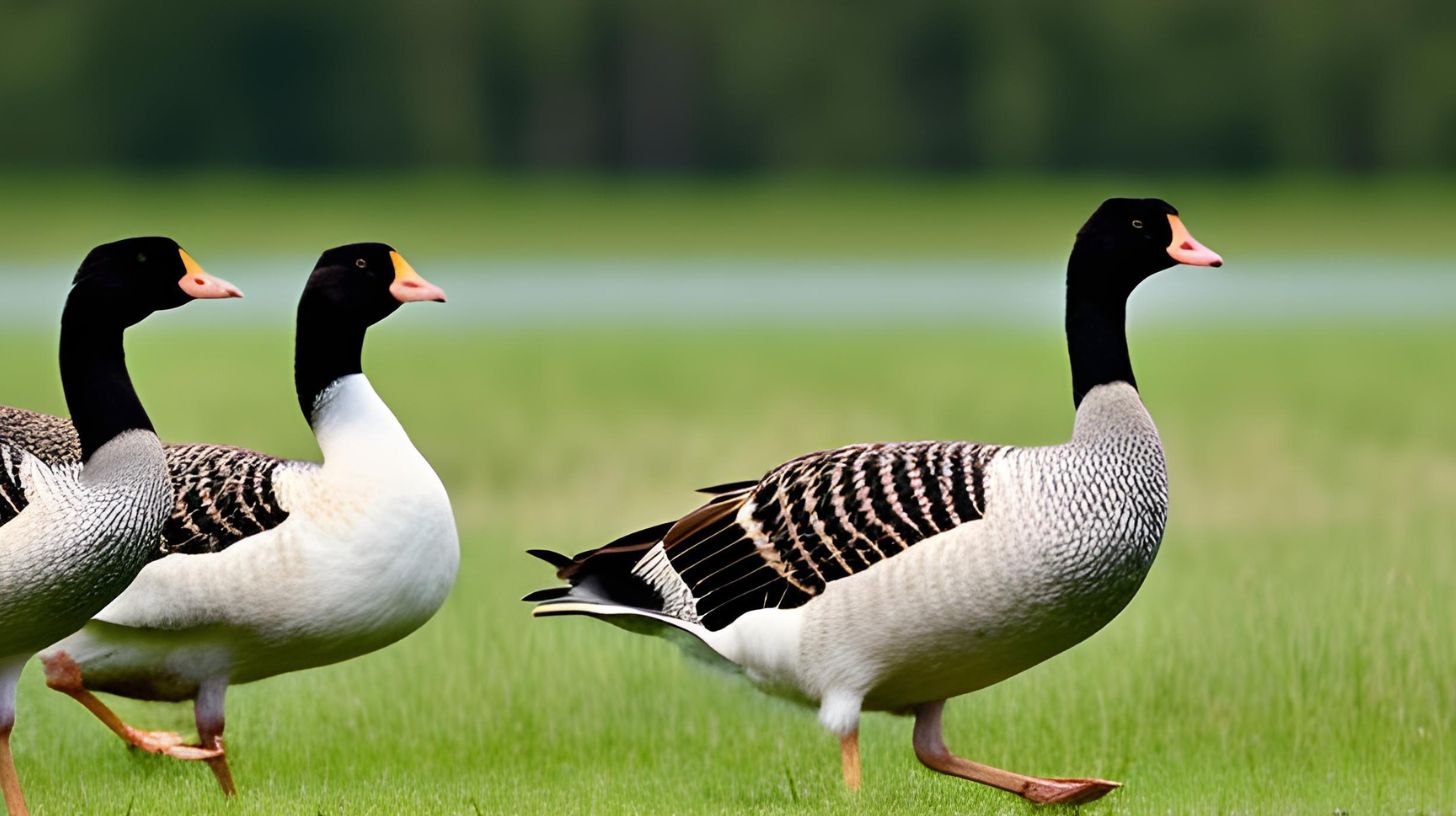Do Geese Eat Worms? Geese Mystery

Table of content:
- Why Do Geese Eat Worms?
- What Types of Worms Do Geese Eat?
- Do Baby Geese Eat Worms?
- When Do Geese Start Eating Worms?
- How Do Geese Find Worms to Eat?
- Why Do Geese Eat Worms From the Ground?
- Do Geese Eat Worms Every Day?
- Do Canadian Geese Eat Worms?
- Do Geese Eat Both Worms and Fish?
- Do Wild Geese Eat Worms?
- Final Thoughts
With their long necks and distinctive honking calls, geese are a familiar sight near lakes, ponds, and other bodies of water. But what exactly do geese eat? Do geese eat worms as part of their diet?
So in short, yes, geese do eat worms as part of their omnivorous diet, especially during breeding season when they require more protein. Worms provide an important source of protein and fat for geese during this energetically demanding period.
Why Do Geese Eat Worms?
Geese eat worms for a few key reasons:
- Protein source – Worms contain high quality protein and essential amino acids that geese need during breeding and egg-laying seasons. Goose parents must nourish their goslings, so protein from worms helps geese meet this demand.
- Fat and nutrients – In addition to protein, worms provide vital fat, minerals, and nutrients like iron, zinc, manganese, copper, and Vitamin B12. These nutrients help build healthy eggs, bones, and feathers.
- Foraging behavior – Geese are omnivorous foragers that use their beaks to root through soil and vegetation for food. Worms are easy for geese to pluck from the ground and provide a convenient protein source.
- Opportunistic eating – Geese will opportunistically feed on any easy-to-eat, protein-rich invertebrates as they encounter them while grazing. Worms are common prey when geese are foraging on land.
- Feeding goslings – Adult geese feed worms to their young to provide goslings with high-protein food that supports fast growth and development. Parent geese are very protective and teach goslings to forage.
So in summary, worms are a nutritious food source that aligns well with geese’s foraging lifestyle and protein needs during breeding season. Their opportunistic and omnivorous diet compels geese to consume worms when available.
What Types of Worms Do Geese Eat?
Geese will eat a variety of worm species, including:
- Earthworms – The most common worm geese eat. Earthworms live in soil and are a major part of the diet.
- Mealworms – The larval form of the mealworm beetle. A favorite worm of geese.
- Bloodworms – Aquatic larvae that geese forage in shallow water.
- Nightcrawlers – Large earthworm species that emerge at night. Provide substantial protein.
- Leeches – Blood-sucking worms that cling to aquatic plants. Open water geese will readily eat.
- Aquatic worms – Diverse groups like ragworms, tubifex, and blackworms that live in mud or tubes.
- Parasitic worms – Roundworms, tapeworms, and flukes that infect geese. Geese may inadvertently consume while grazing.
Geese are not picky and will eat any worm species they encounter, both terrestrial and aquatic. Their varied diet exposes them to many types of worms as protein sources.
Do Baby Geese Eat Worms?
Yes, goslings (baby geese) will eat worms as part of their early diet. In fact, parent geese intentionally feed worms to goslings to provide them with high-protein nourishment.
- Goslings begin eating solid foods like worms within 36 hours of hatching from the egg. At first, the parents chew the food and then regurgitate it to the goslings.
- After a week, goslings start foraging themselves but still rely heavily on their parents for food. The parents continue to present goslings with choice morsels like worms to ensure proper nutrition.
- Worms provide vital amino acids, fatty acids, minerals, and vitamins to support the rapid growth and development of goslings.
- Eating worms teaches goslings important foraging skills they will need to feed independently. Following and imitating their parents is key.
- Within 2-3 weeks, goslings are adept at finding worms and other food on their own. But parents continue to watch over and guide them as needed.
So in summary, worms are an integral part of a healthy diet for growing goslings, fed to them deliberately by attentive goose parents. Eating worms helps goslings thrive in their sensitive early weeks.
When Do Geese Start Eating Worms?
Geese start purposefully eating worms as early as 2-3 weeks of age. However, the exact timing depends on a few factors:
- Egg hatching – Goslings eat worms soon after hatching from the egg. Timing varies based on when the eggs hatch after the ~30 day incubation period.
- Protein needs – Hormonal changes initiate the switch to high-protein foods like worms. This occurs around 2-3 weeks when rapid growth begins.
- Foraging skills – Goslings are born ready to eat worms but must develop the foraging skills to find them independently. This takes 2-3 weeks.
- Parental guidance – Parents initiate worm feeding and teach goslings. If parents are delayed, goslings may start later.
- Food availability – Goslings require abundant food sources. Worm supply may dictate when parents push them to switch to worms.
- Brood habits – Some goose parents start worm feeding earlier than others. Individual variation exists among wild broods.
So while 2-3 weeks is typical, geese may start purposefully eating worms from just days old to over one month depending on various factors influencing the parents and goslings.
How Do Geese Find Worms to Eat?
Geese rely on their excellent senses and foraging adaptations to locate worms:
- Sight – Geese scan the ground visually to spot worm castings, holes, or movements indicating worms under the surface. Their wide-angle vision aids worm detection.
- Touch – Geese probe the ground with their beak and are highly sensitive to touch. If they contact a worm, they grab it.
- Smell – Geese smell chemical cues from worms and sniff the air or ground to pinpoint worm locations.
- Hearing – Geese may hear worms moving underground and target their foraging efforts accordingly.
- Foraging – Geese walk steadily while bobbing their head back and forth to cover ground efficiently while hunting visually for worms.
- Habitat selection – Geese seek out lawns, wet fields, and muddy areas where worms thrive and emerge. Experience guides their foraging habitat preference.
- Time of day – Geese may feed early in the day when worms are closest to the surface before heat drives them down.
Through their keen sensory adaptation for foraging and ability to select optimal worm habitats, geese are extremely adept at locating worm prey. This serves their purposes well as geese rely heavily on worms while breeding.
Why Do Geese Eat Worms From the Ground?
Geese forage for worms on the ground because it allows them to easily access a concentrated, abundant protein source:
- Earthworms live in soil and leaf litter, coming to the surface to feed and mate. For geese, this makes worms easy to catch and consume.
- Lawns, fields, and shorelines provide wide open foraging spaces where geese can walk while hunting visually for worms. Short grass helps them spot worms.
- Wet, muddy areas are worm hotspots, as moisture enables worms to thrive near the surface. Geese target these locations.
- Worms congregate in shallow burrows, casts, and tunnels, concentrating themselves for efficient harvest by geese.
- Catching worms underground avoids the need to pursue fast-moving insects or aquatic prey while still obtaining high protein.
- Rooting in the substrate with their beak is an innate foraging skill geese are adapted for and mastered.
- Foraging on land allows geese to simultaneously graze on greens, seeds, and vegetation while hunting for worms.
In short, earthworms provide an abundant, accessible protein buffet perfectly aligned with geese’s terrestrial foraging abilities. By hunting worms on the ground, geese can efficiently gorge on this nutritious food source.
Do Geese Eat Worms Every Day?
Geese do not necessarily eat worms every single day but they do consume them on a regular, frequent basis:
- During spring breeding season, geese actively seek out and consume worms as their main protein source. They may eat worms daily at this time.
- In summer, geese continue eating worms regularly to fuel molting and rebuild energy reserves after breeding.
- When nurturing goslings in summer, parent geese provide worms daily to meet the high protein requirements of their rapidly growing young.
- In fall and winter, geese shift focus to grains and vegetation. But they still opportunistically eat worms whenever encountered.
- Near agricultural fields, geese may eat more grains than worms in colder months if abundant crops are available.
- In migrated habitats like golf courses and city parks, worms are readily available year-round for geese to eat.
So while not an everyday food source, worms are a consistent part of a goose’s weekly diet, especially during key life stages like breeding, molting, migration, and rearing young. Their protein and nutrients are relied upon heavily.
Do Canadian Geese Eat Worms?
Yes, Canadian Geese absolutely do eat worms as a regular part of their diet.
- Canadian geese have the same dietary habits and preferences as other goose species when it comes to consuming worms.
- They actively hunt earthworms and other worm prey on the ground during breeding season.
- Goslings are fed worms frequently by their parents for the first few weeks after hatching.
- Canadian geese see worms as fair game whenever they encounter them while grazing.
- Their serrated beaks allow Canadian geese to easily uproot and consume worms.
- As migratory birds, Canadian geese must fuel up on protein before long journeys. Worms help meet this need.
- In suburban areas, Canadian geese take advantage of ample worm sources on lawns, golf courses, parks, and sports fields year-round.
So the ubiquitous Canadian goose shares the same taste for worms as its relatives. Their keen foraging skills and adaptable habitat preferences give them access to this nutritious food source across North America.
Do Geese Eat Both Worms and Fish?
Yes, geese are opportunistic feeders that will eat both worms and fish as they come across them:
- As omnivores, geese consume a diverse diet. This includes fish and worms as key protein sources.
- In ponds and lakes, geese catch and swallow small fish like minnows, trout, sunfish, and perch.
- Along shorelines and muddy areas, geese probe the ground for worms and grubs.
- Geese may pick fish out of the water and then immediately grab worms from the shore without preference. They eat whatever protein they encounter.
- Suburban geese may acquire fish from backyard ponds or worms from lawns on the same feeding trips.
- Parent geese provide both worms and small fish to goslings, whichever is most readily available.
- Since geese eat both plants and animals, they don’t differentiate between catching worms on land or fish in water. Both satisfy protein needs.
- As migratory birds move between habitats, geese flexibly take advantage of whatever protein sources they come across, whether worms or fish.
So geese certainly don’t discriminate when it comes to worms versus fish. Both provide important nutrients and variety in their omnivorous diet.
Do Wild Geese Eat Worms?
Wild geese of all species readily consume worms as part of their natural diet:
- Earthworms and other worm types are a natural prey item for wild geese across North America.
- Wild geese have specialized beak and tongue structures allowing them to grab and swallow worms efficiently.
- Worms provide important protein, fat, and nutrients to support egg production and gosling growth in the spring.
- Wild geese inhabiting Arctic regions still seek out worms and invertebrates during the breeding season.
- Parent wild geese guide goslings to prime worm foraging grounds and teach them to hunt for worms.
- Wild geese utilize excellent vision and smell to locate worm concentrations in wilderness foraging habitats.
- Wild geese opportunistically feed on worms when migrating and wintering in agricultural fields and wetlands.
- Loss of wetland habitats can reduce wild geese’s access to prime worm sources.
So just like their domestic and urban relatives, wild geese are programmed to target nutritious worms as part of their varied omnivorous diet. For wild geese, worms provide a vital protein boost.
Final Thoughts
In summary, worms do make up a regular part of geese’s diet, especially during key life phases like breeding season when they need extra protein. Geese employ specialized adaptations like visual foraging, sensitive beaks, and habitat selection to target worms and obtain their nutritional benefits. While not necessarily a daily menu item, earthworms and other worm species provide an abundant protein source perfectly matched to geese’s anatomy and foraging lifestyle.
By opportunistically feeding on worms, geese obtain essential nourishment to thrive and rear healthy goslings. So the answer is clear – worms and geese are a perfect pair when it comes to avian nutrition.
Welcome. I’m Adreena Shanum, the proud owner of this website, and I am incredibly passionate about animals, especially poultry. I founded adreenapets.com as a labor of love, stemming from my desire to share my knowledge and experiences with poultry enthusiasts worldwide.




